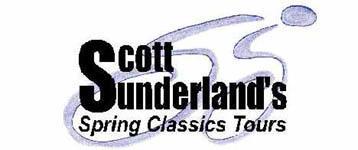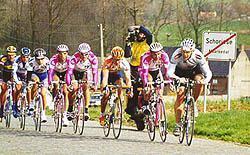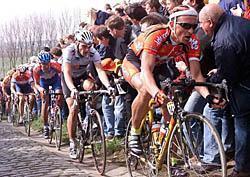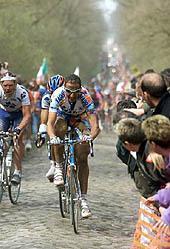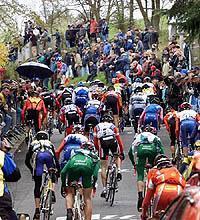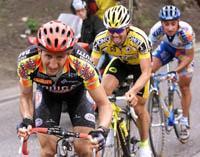Race descriptionsTour PackagesThe Flanders, Hell of the North and Ardennes trips are designed to overlap with each other to allow you to stay on as long as you like. All trips will include:
Flanders Week, March 29-April 8, 2002
Hell of the North Week, April 9-15, 2002
World Cup Extravaganza, April 5-15, 2002
Ardennes Week, April 16-22, 2002
The RacesOur guides will use their extensive knowledge of the roads and the races to give you great vantage points where the "action" is most likely to happen. GP E3 Harelbeke - Cat. 1.1
The Vlaamse Wielerweek begins with the E3 Harelbeke and continues with the Brabantse Pijl. The races mark the lead up to the Ronde Van Vlaanderen which is staged the following Sunday. The E3 classic is the most apporopriate dress rehearsals for the Ronde Van Vlaanderen, which takes place next Sunday. The parcours is similar, although shorter but many of the climbs are tackled. The race is similar, being one of attrition as the cobbles, wind and climbs tend to decimate the bunch. Anyone who wants to go well in the Ronde Van Vlaanderen is at this race and because it is a semi classic it provided a great opportunity to get close to the riders who will be much less accessible when they're at the Classics. We can take the opportunity to look over the course for Flanders and ride some of these legendary climbs that the pro's say are "so hard". Brabantse Pijl - Cat. 1.2 The Brabantse Pijl (Brabant Arrow) is held on the Sunday prior to the Ronde van van Vlaanderen. In past years it has been defined by the seven climbs of the Cote d'Alsemberg (12% in parts). The race starts at midday and normlly the first Alsemberg climb comes after 100 km of racing. The riders then do 6 laps, each 16.3 kilometres long until the finish. The race distance is 193 kms. Once again this race provided a great opportunity to get close to the riders and also do some riding of our own. Driedaagse Van De Panne - Cat. 2.2 The Driedaagse Van De Panne is a 3 day race compromising of 3 road stages and a final individual time trial. The final day is held in De Panne and consists of a road stage usually of 110 km and a time trial of approximately 15km. In 2001, Nico Mattan (Cofidis) won this race. Previous winners include 2000 Vjatcheslav Ekimov, 1999 Peter Van Petegem (Bel), 1998 Michele Bartoli (Ita), 1997 Johan Museeuw (Bel). Again all the "Big Hitters" are here and you have 3 days in which to get that elusive photo with your favourite rider. Ronde Van Vlaanderen/Tour des Flandres - Cat. CDM
What can we say? The Tour of Flanders is one of the most prestigious of the spring classics, or of any cycle race. It's an endurance race in the true sense. A longer distance, 269 kms, with more than a dozen climbs, varying year by year. There are no Alpine or Pyrenéean mountains, but most of the climbs are narrow and steep, and several are cobbled. Although they are tough in their own right, they also raise the tempo in between since everybody wants to be in a good position when they start. The first race was held in 1913, and with a pause for the first world war, it has been held ever since. Four riders have three victories: Belgians Achiel Buysse (1940, 1941, 1943), Eric Leman (1970, 1972, 1973) and Johan Museeuw (1993, 1995, 1998) The Italian Fiorenzo Magni has also won three times (1949, 1950, 1951). Gianluca Bortolami was the victor in the 2001 (85th) edition of the Ronde Van Vlaanderen. We will see the race a number of times as it zig zags the countryside. What we don't see live we will see on television from the luxury of our heated van or from the comfort of one of the many cafes along the route. There will also be the opportunity to ride in an organized "CycloSportif" Tour of Flanders on the Saturday before. Distances are the full 269 km, 140 km or 70 km. Belgium has 56 wins, two each by Eddy Merckx, Rik Van Steenbergen, Rik van Looy, Walter Godefroot and Edwig van Hooydonck. Also Dutchman Jan Raas has two victories of the Netherlands' total of 10. Other countries: Italy 7, France 3 and one each for Switzerland, Great Britain, Germany and Denmark (Rolf Sörensen). Gent-Wevelgem - Cat. 1.HC The 214 kilometre Gent-Wevelgem comes in the midst of the northern spring classics, traditionally being a mid-week race between the Ronde Van Vlaanderen and Paris-Roubaix. It is rated as Hors Categorie (HC), one below a classic, however it follows many of the roads that the "Ronde" uses, being shorter by 53 kilometres. The parcours is considerably flatter than the Ronde, containing only 4 climbs - the Monteberg and Kemmelberg, each being done twice. They come in the last 75 kilometres, and are not usually enough to enforce a selection. Thus the race is more likely to end in a bunch sprint, as a glance through the past winners list will show. 1991 Djamolidine Abdujaparov (Uzb, 1992 Mario Cipollini (Ita), 1993 Mario Cipollini (Ita), 1994 Wilfried Peeters (Bel), 1995 Lars Michaelsen (Den), 1996 Tom Steels (Bel), 1997 Philippe Gaumont (Fra), 1998 Frank Vandenbroucke (Bel), 1999 Tom Steels (Bel), 2000 Geert van Bondt (Farm Frites), 2001 George Hincapie (US Postal). Once again we will take the vans and follow the race as it zig zags the countryside. Our guides will use their extensive knowledge of the roads and the races to give you great vantage points where the "action" is most likely to happen. Grand Prix Pino Cerami - Cat. 1.3 This race is a favourite of Scott's. He came 3rd here in 1998. He was beaten by Italian Marco Serpellini who broke away from Scott and Biagio Conte near the finish of this 200km semi classic. Last year Mercury tasted victory here when German Jan Bratkowski won but before that, Italians had won the previous 5 editions. Scott got his revenge in 2001 when he won the race with a solo breakaway. Another good race to watch as it's lower key than the classics and the riders should be more approachable. Paris - Roubaix - Cat. CDM
In 2002 it will be the 100th edition of this 107 year old classic. The Paris-Roubaix is one of the oldest events on the calendar and rightly deserves its "Queen of the Classics" dubbing. Although it often goes by that other name, "The Hell of the North", the P-R is eagerly contested by a select group of the peloton. No other race really compares, but the results show that the strongest are at home in this race and they are often amongst the world's greatest cyclists. Sometimes the occasional outsider gets away, but more often than not you will see a guy with a lot of experience and more than a modicum of horsepower lead the race into and around the fabled Roubaix velodrome. Large bunch sprints are uncommon. Last year, it was over 255 kilometres, 49 of which are of the infamous pavé that define the race. These sharp, lumpy roads are ancient and are preserved now as national monuments. They are uncomfortable enough in a large white team van, let alone on a bike with a small amount of rubber separating you from the road. Sometimes less if you are the unfortunate victim of a crash or a puncture - more common in this race than anywhere else. It's one thing to watch this race on TV but it's another to see it live on the cobbles. You can feel every bone jarring thump as the wheels go over the pave, see the anguish on the faces of the riders, hear the crunching of bicycles and bodies on stone. Some riders live to do this race. I think they need help! Mapei have a strangle hold on this race with 5 wins from the past 7 starts and 2 clean sweeps of the podium, broken by a Domo-Farm Frites 1-2-3 in 2001. Who will it be this year? You will see the Queen of Classics "up close and live" from a number of vantage points along the course including the start and the finish on the historic velodrome of Roubaix as well as keeping up to date via our "in car" television. Fleche Wallonne/Waalse Pijl - 1.HC/CDM
La Fleche Wallonne is the first of the Ardennes classics, and is rated as Hors Categorie (HC). There is also a women's version of the race that we will see as well, and it is part of the women's World Cup (CDM). La Flèche Wallone is often quite a good predictor for Liege-Bastogne-Liege, although it is rare that the two races are won by the same rider. Last year it was Rik Verbrugghe took the honours from Ivan Basso and Jörg Jaksche, dropping them both on the final ascent of the Mur de Huy. Who will forget three years ago when Michele Bartoli won in a truly epic race after escaping for 80 kilometres in the snow, while Hanka Kupfernagel rode similarly to win the women's race. Bartoli paid for his efforts though, as he was beaten in LBL by Frank Vandenbroucke. The two races are less cobbled and hillier than the previous three rounds of the World Cup, and see a different type of rider win. Laurent Jalabert, Davide Rebellin, Michael Boogerd, Francisco Casagrande, and Oscar Camenzind are more suited to this race than the cobbled classics, and it will be a fascinating battle on Wednesday to see who gets to the top of the Mur de Huy, with its maximum grade of 20%, for the third time. For this race we can see the start and then go on to Huy to watch the men come through for the 1st time and then the finish of the Women's event and the final 2 laps of the men. Liege-Bastogne-Liege - CDM
Affectionately known as 'La Doyenne' this race is the oldest of the classics, first held in 1890. It is also the hilliest of the classics, containing 10 climbs of over 1.5 kilometres in length, as well as having a very undulating route. There are far fewer cobbles compared with the Ronde or Paris-Roubaix, and it suits a lighter but still powerful rider than those two Classics. Oscar Cameznind from Lampre was the winner last year. Bartoli was the winner in '97 and '98 while Frank Vandenbroucke won in '99 and Paolo Bettini won in 2000. Laurent Jalabert is desperate to win this race after two 2nd places behind Bartoli, and this year may be his last chance. We will be able to see plenty of this race as they head down to Bastogne and back. We will also be able to check out some of those classic Adrennes climbs in an organized bike ride on the Saturday. Back to Sunderland Tours main page Read More About Your Tour Leaders
|
||||||||||||||||||||||||||||||||||||||||||||||||||||||||||||||||||||||||||||||||||||||||||||||||||
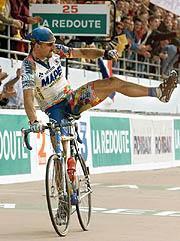
 presents
presents